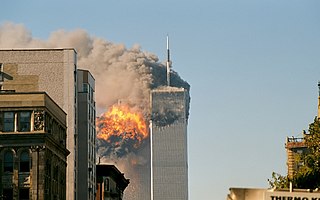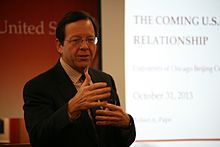Coercion involves compelling a party to act in an involuntary manner by the use of threats, including threats to use force against that party. It involves a set of forceful actions which violate the free will of an individual in order to induce a desired response. These actions may include extortion, blackmail, or even torture and sexual assault.

Terrorism, in its broadest sense, is the use of intentional violence and fear to achieve political or ideological aims. The term is used in this regard primarily to refer to intentional violence during peacetime or in the context of war against non-combatants. There are various different definitions of terrorism, with no universal agreement about it.

Counterterrorism, also known as anti-terrorism, relates to the practices, military tactics, techniques, and strategies that governments, law enforcement, businesses, and intelligence agencies use to combat or eliminate terrorism.
Religious terrorism is a type of religious violence where terrorism is used as a strategy to achieve certain religious goals or which are influenced by religious beliefs and/or identity.
Islamic terrorism refers to terrorist acts with religious motivations carried out by fundamentalist militant Islamists and Islamic extremists.

Deterrence theory refers to the scholarship and practice of how threats or limited force by one party can convince another party to refrain from initiating some other course of action. The topic gained increased prominence as a military strategy during the Cold War with regard to the use of nuclear weapons and is related to but distinct from the concept of mutual assured destruction, according to which a full-scale nuclear attack on a power with second-strike capability would devastate both parties. The central problem of deterrence revolves around how to credibly threaten military action or nuclear punishment on the adversary despite its costs to the deterrer. Deterrence is one strategy to achieve peace and avoid conflict escalation in peace and conflict studies.

Dying to Win: The Strategic Logic of Suicide Terrorism is Robert Pape's analysis of suicide terrorism from a strategic, social, and psychological point of view. It is based on a database he has compiled at the University of Chicago, where he directs the Chicago Project on Security and Threats (CPOST). The book's conclusions are based on data from 315 suicide terrorism attacks around the world from 1980 through 2003. Of these, 301 were classified into 18 different campaigns by 11 different militant groups; the remaining 14 appear to have been isolated. Published in May 2005, Pape's volume has been widely noticed by the press, the public, and policymakers alike, and has earned praise from the likes of Peter Bergen, Congressman Ron Paul (R-Texas), and Michael Scheuer.
Management of Savagery: The Most Critical Stage Through Which the Islamic Nation Will Pass, also translated as Administration of Savagery, is a book by the Islamist strategist Abu Bakr Naji, published on the Internet in 2004. It aimed to provide a strategy for al-Qaeda and other extremists whereby they could create a new Islamic caliphate.
The tactics of terrorism are diverse. As important as the actual attacks is the cultivation in the target population of the fear of such attacks, so that the threat of violence becomes as effective as actual violence. The different tactics that terrorist groups utilize can be very simple to extremely complex.
Radicalization is the process by which an individual or a group comes to adopt increasingly radical views in opposition to a political, social, or religious status quo. The ideas of society at large shape the outcomes of radicalization. Radicalization can result in both violent and nonviolent action – academic literature focuses on radicalization into violent extremism (RVE) or radicalisation leading to acts of terrorism. Multiple separate pathways can promote the process of radicalization, which can be independent but are usually mutually reinforcing.
Clement Victor Gunaratne was Sri Lanka's Cabinet Minister of Industries Development. He and his wife along with 20 others were killed by a suicide bomber of the LTTE organization on 7 June 2000.

A suicide attack is a deliberate attack in which the perpetrators knowingly sacrifice their own lives as part of the attack. These attacks are often associated with terrorism or military conflicts and are considered a form of murder–suicide. Suicide attacks involving explosives are commonly referred to as suicide bombings. In the context of terrorism, they are also commonly referred to as suicide terrorism. While generally not inherently regulated under international law, suicide attacks in their execution often violate international laws of war, such as prohibitions against perfidy or targeting civilians.

Daniel L. Byman is one of the world's leading researchers on terrorism, Counterterrorism and the Middle East. Dr. Byman is a professor in Georgetown University's Walsh School of Foreign Service and Director of Georgetown's Security Studies Program He is a former Vice-Dean of the school.

The Global Terrorism Database (GTD) is a database of terrorist incidents from 1970 onward. As of May 2021, the list extended through 2019 recording over 200,000 incidents, although data from 1993 is excluded. The database is maintained by the National Consortium for the Study of Terrorism and Responses to Terrorism (START) at the University of Maryland, College Park in the United States. It is also the basis for other terrorism-related measures, such as the Global Terrorism Index (GTI) published by the Institute for Economics and Peace.
The Chicago Project on Security and Threats (CPOST) describes itself as an "international security affairs research institute based at the University of Chicago." Formerly known as the Chicago Project on Security and Terrorism, and the Chicago Project on Suicide Terrorism, it was founded in 2004 by Robert Pape, professor of political science at the University of Chicago and author of Dying to Win, a book about suicide terrorism. It compiles, maintains and publishes the Database on Suicide Attacks, a comprehensive dataset of suicide terrorism around the world that covers attacks from 1974 to 2019. CPOST frequently works closely with the United States government, particularly the Department of Defense.
The Database on Suicide Attacks is a database maintained by the Chicago Project on Security and Threats (CPOST) at the University of Chicago. The database is publicly available and includes all known suicide attacks from 1974 to 2019.
Compellence is a form of coercion that attempts to get an actor to change its behavior through threats to use force or the actual use of limited force. Compellence can be more clearly described as "a political-diplomatic strategy that aims to influence an adversary's will or incentive structure. It is a strategy that combines threats of force, and, if necessary, the limited and selective use of force in discrete and controlled increments, in a bargaining strategy that includes positive inducements. The aim is to induce an adversary to comply with one's demands, or to negotiate the most favorable compromise possible, while simultaneously managing the crisis to prevent unwanted military escalation."
Anonymous terrorism — i.e. terrorist attacks that no group or person has been publicly claimed responsibility for — constitutes about six out of seven terrorist attacks in the world at least since 1998. This proportion has been called "surprisingly high" and is in conflict with the conventional wisdom that terrorists "mount an operation to call attention to their grievances" and to "the costs of ignoring" those grievances, which can't happen if the perpetrators don't make public the "cost", i.e. announce that an event of killing and/or destruction was their work. A number of theories have been advanced as to why terror groups sometimes don't claim an attack, including: a motivation not to force concessions from the enemy, but to punish or destroy them, by killing and demoralizing them; an interest in plausible deniability; avoiding retaliation; and a byproduct of a disconnect between terror leadership and operatives.
In international relations, coercion refers to the imposition of costs by a state on other states and non-state actors to prevent them from taking an action (deterrence) or to compel them to take an action (compellence). Coercion frequently takes the form of threats or the use of limited military force. It is commonly seen as analytically distinct from persuasion, brute force, or full-on war.







